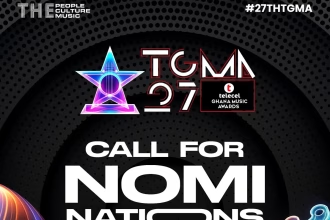Ghanaian gospel musician Nii Okai has waded into conversations about the introduction of the controversial electronic levy by the government.
The E-levy is a 1.75% tax applied on transactions made on electronic or digital platforms.
It is expected to generate an estimated amount of GH¢ 6,96 billion in 2022, GH¢7.89 billion in 2023, GH¢8.92 billion in 2024, and GH¢10.09 billion in 2025.
However, the gospel artiste holds the opinion that it is being done in haste.
“But why the sudden rush to do it? because there must be a reason and anything that is not really well thought through is bound to face all forms of oppositions either before, during, or after implementation. So, for me, I’ll say, if it is good time will tell so take your time and engage and get people on board but don’t rush,” he told ClassFM.
Nii Okai is currently promoting his album titled “Revive Us”.
The opposition National Democratic Congress led a ‘Yentua Demonstration’ against the levy on 10 February 2022 .
What is the E-levy?
The E-levy is a tax applied on transactions made on electronic or digital platforms. The Minister for Finance, Ken Ofori Atta, announced in parliament the intention to implement the bill where 1.75% will be taxed on all digital transactions.
The E-Levy is expected to generate an estimated amount of GH¢ 6,96 billion in 2022, GH¢7.89 billion in 2023, GH¢8.92 billion in 2024 and GH¢10.09 billion in 2025.
It is also one of the measures to increase the country’s tax to Gross Domestic Product (GDP) ratio from 13 per cent to 16 per cent.
According to Mr Ofori-Atta, the E-Levy will not be applicable for the following:
- Cumulative transfers of GHC100 per day made by the same person.
- Transfers between accounts owned by the same person.
- Transfers for the payment of taxes, fees and charges on the Ghana.gov platform
- Electronic clearing of cheques.
- Specified merchant payments (that is, payments to commercial establishments registered with the GRA for income tax and VAT purposes).
- Transfers between principal, master agent and agent’s accounts.
On the other hand, the E-Levy will be charged fully on the following:
- Mobile money transfers between accounts on the same electronic money issuer (EMI).
- Mobile money transfers from an account on one EMI to a recipient on another EMI.
- Transfers from bank accounts to mobile money accounts.
- Transfer from mobile money accounts to bank accounts.
- Bank transfers on a digital platform or application which originate from a bank account belonging to an individual to another individual.
What is the state of the E-levy passage?
Since the announcement by the minister in parliament last year, the yet-to-be passed tax has faced strong rejections with tax experts describing it as harsh, considering the economic situation in the country but the government insists it would pass it.
After fierce resistance, Mr Ofori-Atta has withdrawn the proposal from parliament to revise the rate from the initial 1.75 per cent to 1.5 per cent.
Yet, a section of Ghanaians have rejected its implementation with a demonstration through the principal streets of Accra on Thursday.
The levy has divided parliament, with the Majority pushing for approval, while the Minority has kicked against it.
There was a split vote of 12 for each side at parliament’s finance committee until the chairman cast the decisive vote favouring the proposal.
The chamber turned chaotic as MPs pushed, shoved and punched each other during the heated exchanges that many observers have since condemned.
This was after the Speaker had left and delegated the First Deputy Speaker, Joe Osei Owusu, to take over proceedings.
The Minority has said it will do all it can to ensure that the bill does not see the light of day, insisting it is not in the best interest of Ghanaians.
Discussions on the proposed levy
Finance Lecturer at the University of Ghana Business School, Professor Godfred Bokpin, has described the most talked-about tax,as regressive.
Prof. Bokpin said E-levy cannot be used to cushion government after spending extravagantly.
He believes the E-levy would not solve the economic challenges faced by the country.
The Institute of Statistical, Social and Economic Research (ISSER) has also described the 1.75% E-Levy as harsh.
ISSER Director, Professor Peter Quartey, has suggested a reduction to a rate between 0.5 and 0.75 percent.
Also, the Ghana National Chamber of Commerce and Industry (GNCCI) has called on the government to reconsider imposing a 1.75% levy on mobile money and other electronic transactions in the country.
The chamber maintained that the proposed levy would further worsen the plight of businesses, particularly small and medium enterprises (SMEs), which were mainly growth-driven and susceptible to economic and market cycles.
GNCCI said to increase revenue, the government should rather focus on finding innovative ways of widening the tax net, ensuring tax compliance, as well as addressing the rising levels of tax exemptions which did not commensurate business growth.
Investment banking firm C-nergy Ghana Limited joined the chorus in admonishing the government to review the proposed Electronic Transaction Levy.
Even though C-nergy is not entirely opposed to the levy, they hold the opinion that “the 1.75% E-Transactions levy rate is high”.
Analysts from the firm are of the belief that the scope and coverage of the levy are wide enough to generate the targeted revenues “if it is monitored and managed effectively”.
For Speaker of Parliament Alban Bagbin, the approval of the E-levy will spell doom for the governing NPP in the 2024 elections.
“It is very clear that if this your E-Levy goes through, you (NPP) have lost the election,” he said during a speech at a meeting with former legislators on Thursday, 23 December 2021.
















